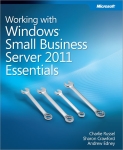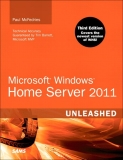By Philip Churchill on April 05th, 2010
Backup Solutions – The Options
There are cheap ways to backup (optical media, external hard drive, flash drives) and there are more convenient and flexible methods such as:
- Online Data Backup
- A NAS (Network Attached Storage) device
or of course there is a Windows Home Server.
Want to know more about these solutions? No problem – James Callahan has the details here.
Share this WHS Article with Others:




http://www.miteredcode.com/?p=2486 is the correct link
Thanks Jim Evans, I have corrected the link – Oops!
There are a wide array of methods which can be used to backup data. Depending on the amount of data to be backed up, the importance of that data, and the funds available to you. Some of the most common data storage solutions include:
Tape Backup: At one point the preferred data solution, with the lowered costs and availability of other media solutions (such as DVD-R), tape backup has become less popular. Tape backup comes in a number of varieties: 8mm helical scan technology for mid-range systems, 4mm helical for low-end systems, and technologies such as AIT for high-end systems. The write speed for magnetic tape is relatively slow when compared to other solutions, but durability is very high. With falling costs, it is unlikely tape backup will remain a reasonable option much into the future.
Flash Drives: For small amount of data, flash drives (also known as thumb drives or memory sticks) are a wonderful solution. They are small enough to fit in your pocket, offer unlimited rewrite capabilities, and are easy to plug into any computer with USB port. Capacity ranges from 64MB to upwards of 1GB. Data durability is estimated to be approximately ten years, and unlike hard drive backups they are not susceptible to damage by magnets.
CD-R / CD-RW: CD-R and CD-RW technology offers a number of advantages as a backup solution. Both types of media are incredibly cheap (below ten cents a gigabyte if bought in bulk), write times are fast, and the data is easily accessible by virtually all computers. Capacity is 650-700MB. Recent studies have indicated that durability is less than was initially presumed, with retention dropping after five years.
DVD Technology: DVD-R, DVD+R, DVD-RW, DVD+RW, DVD-RAM, and dual layer DVD technologies are essentially the replacement for CD backup for most people. DVD technologies can hold either 4.7GB or, in the case of dual-layer DVDs, 8.5GB. Media is currently comparable in pricing with CDs, with discs available in bulk for $0.50 each. DVDs have similar durability to CD technologies.
Hard Drives: As hard drive prices continue to drop, many businesses and individuals are turning to external hard drives as a backup solution. The cost per gigabyte can be very cheap (as low as $0.20 if bought in bulk), and copying the data is incredibly easy. Hard drives are prone to physical malfunctions and corruption by a number of forces, however, making their durability questionable.
FTP: Solutions exist online which allow you to upload your data to a secure server collocated in a protected environment. This is often a good option for important data which is not particularly large. Security is a concern for some, but most FTP solutions offer extensive security features to better protect your data. These data farms backup their data in turn, usually using tape or DVD technology (or a hybrid of the two), further ensuring your data’s durability.
As technologies continue to develop and prices continue to drop, more solutions appear each day. At present a good recommendation for small amounts of highly critical data would be FTP, for anything else with a limited lifespan DVD media, and for long-term data storage, tape remains a strong option.
Regards
Peddu
Hostcats.com